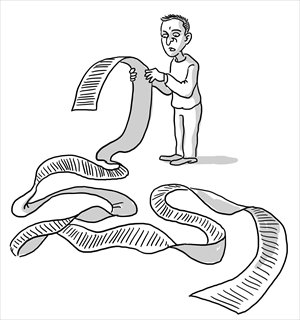HOME >> OP-ED
Paper trail flusters overseas Chinese
By Rong Xiaoqing Source:Global Times Published: 2013-8-15 17:13:01

Illustration: Liu Rui/GT
I once asked Chinese immigrant writer Ha Jin what was the biggest cultural shock he encountered in the early days when he moved to the US from China in the late 1980s. "Paper," he said. "In this country there is paper everywhere."I thought he meant the abundant free toilet paper in the public bathrooms that is sometimes left to roll around the floor by wasteful visitors. After all, that was in the early 2000s when as a newcomer myself I was shocked to see such luxury given my fresh memories of the frugality in my own country.
But Jin corrected me. He meant paperwork: "Everything needs to be put on paper. And every piece of paper needs to be well kept in case it might need to be traced back in the future."
Then in 2011, when American-born Chinese playwright David Henry Hwang's new play Chinglish, about the cultural shocks that a US businessman encounters in China, opened on Broadway, I asked him the same question.
"Contracts," he said. "In the US, a contract is something both parties know they have to stick to. In China, it's more like a reference."
In the old days when the two cultures were very distant, this difference was at most an entertaining topic for cultural observers.
But the old days have gone. Between the 1980s and the 2010s, the Chinese haven't changed much in the way they deal with paperwork, but China has changed a lot.
Today, the number of Americans living and doing business in China have also increased tremendously, and they can find it challenging to "do as the Romans do."
Chinese in the US, where the legal system sprawls across every part of their lives, have suffered harder knocks for their negligence and ignorance about the world of contracts.
I've seen too many new Chinese immigrants start businesses with relatives or friends. And when things went wrong, they were left helpless because they, out of trust, hadn't signed any contracts.
I've also seen too many Chinese get into difficulties because they sponsored relatives for green card applications and signed the mandatory affidavits promising the beneficiaries wouldn't claim welfare in the near future.
They were all shocked to get letters from the authorities telling them things had turned out otherwise and asking them to pay back welfare funds given to their relatives.
These people never thought they would be held accountable even when they had signed a piece of paper.
During the wave of attacks from short sellers against Chinese companies listed on the stock markets in the US in recent years, many Chinese companies were ensnared for breaching contracts.
Some told the investors one thing in the business plan and then did something else. Some decided to spin off assets without telling shareholders. And some even have different articles in the Chinese and English versions of contracts. All brought endless legal troubles on themselves.
This would have surprised Confucius. The Chinese saying, "Even a wagon pulled by four horses is not able to catch words that have been said," originates from The Analects of Confucius, showing traditional Chinese culture gives a lot of weight to promises.
And in the old days, a fingerprint of a parent on a piece of paper used to be considered serious enough to sell a baby.
Since those days, there has been a steep decline in the common-sense approach to the meaning of agreements, thanks to decades of blind profit-chasing.
But if the cultural clashes have a silver lining, it might be that changes can result from the pain.
The documents filed by the Chinese companies that seek to be publicly listed in the US these days are much more transparent, a big difference that's come after only a few years.
Jason Chen, chairman of World Union Properties, a major real estate brokerage company in China, told me in a recent visit to New York that he is thinking of bringing the US model of detailed contracts back to China for his Chinese clients seeking to buy properties.
"In China, the contract is really thin and vague. When a problem happens, the buyers often deal with it by protesting in front of the developers' offices rather than checking the contract," said Chen.
These may be small steps. But they're helping China adapt to a world of paper.
The author is a New York-based journalist. rong_xiaoqing@hotmail.com
Posted in: Viewpoint